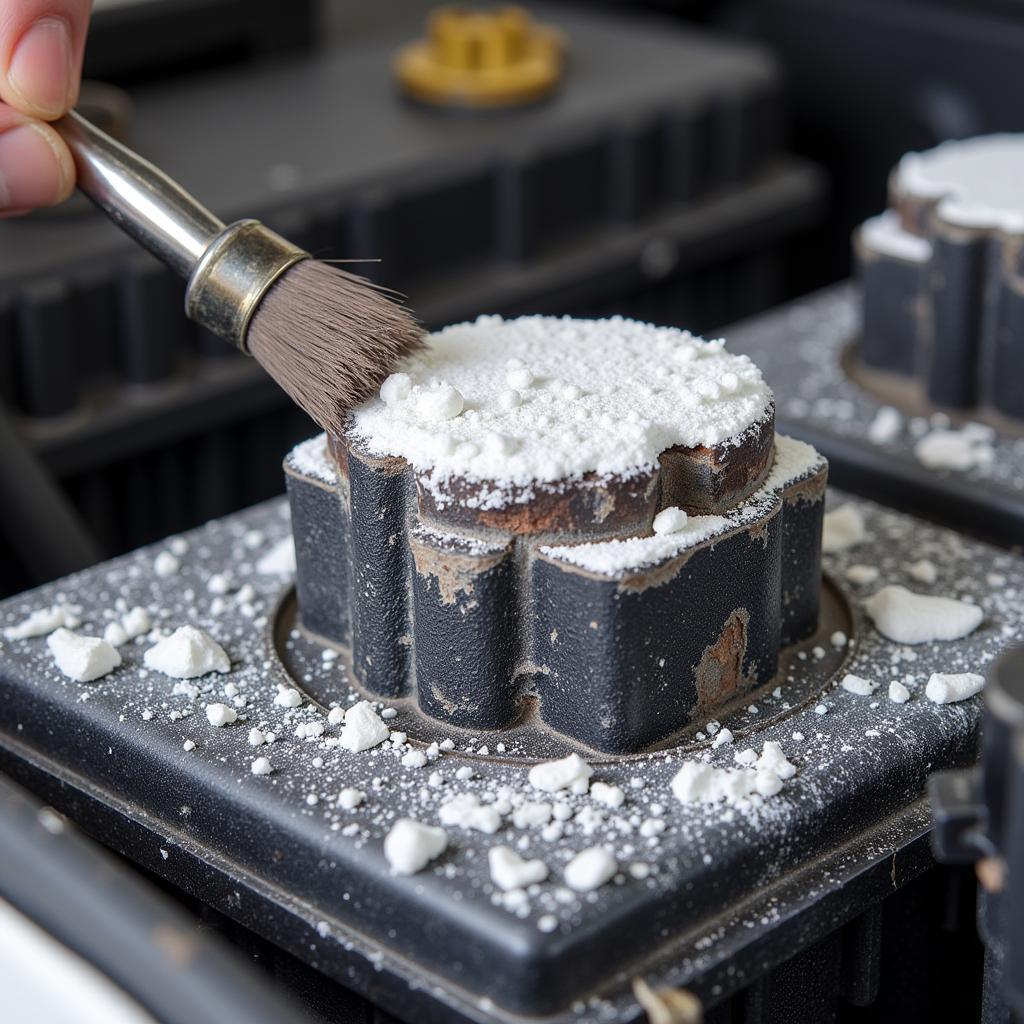Car batteries are essential for starting your vehicle and powering electrical systems. A dead or malfunctioning battery can leave you stranded. Knowing How To Repair Car Battery At Home can save you time and money. This guide provides valuable insights and practical steps to diagnose and potentially fix common car battery issues.
Learning some basic car repair skills can be incredibly helpful, especially before embarking on a long drive. Check out our guide on how to learn basic car repair before long drive for some essential tips.
Understanding Your Car Battery
Before attempting any repairs, it’s crucial to understand the basics of your car battery. It’s a lead-acid battery that stores chemical energy and converts it into electrical energy to power your car’s starter, lights, and other electrical components. Over time, the chemical reactions within the battery degrade, leading to a reduced ability to hold a charge.
Common Car Battery Problems
Several factors can contribute to car battery problems. These include:
- Corrosion: A buildup of white, powdery substance around the battery terminals can disrupt the flow of electricity.
- Low Electrolyte Levels: The electrolyte solution inside the battery can evaporate, especially in hot climates, leading to reduced performance.
- Faulty Alternator: If the alternator isn’t charging the battery properly, it can lead to a dead battery.
- Parasitic Drain: Even when the car is off, certain electrical components can draw power from the battery, slowly draining it over time.
- Old Age: Car batteries have a limited lifespan, typically between three and five years.
 Cleaning Car Battery Corrosion
Cleaning Car Battery Corrosion
How to Repair Car Battery at Home: Step-by-Step Guide
While not all battery issues can be fixed at home, some common problems can be addressed with basic tools and some know-how. Here’s a step-by-step guide to help you:
- Safety First: Always wear safety glasses and gloves when working with a car battery. Disconnect the negative cable first, followed by the positive cable.
- Inspect the Terminals: Check for corrosion on the battery terminals. If present, clean them with a mixture of baking soda and water applied with a wire brush. Rinse with clean water and dry thoroughly.
- Check Electrolyte Levels: If your battery has removable caps, carefully open them and check the electrolyte level. It should be just above the lead plates. If low, add distilled water to bring it to the correct level.
- Test the Battery: Use a multimeter to test the battery voltage. A fully charged battery should read around 12.6 volts. If the reading is significantly lower, the battery may need to be recharged or replaced.
- Recharge the Battery: If the battery voltage is low, you can try recharging it using a battery charger. Follow the manufacturer’s instructions carefully.
- Reconnect the Battery: Once the battery is charged, reconnect the positive cable first, followed by the negative cable.
If you’re unsure about repairing a remote control car yourself, you might be wondering where to find professional help. We’ve compiled a list of shops specializing in remote control car repair in our article: is there any shop to repair remote control car?
When to Replace Your Car Battery
Even with proper maintenance, car batteries eventually wear out. Here are some signs that it might be time for a replacement:
- Slow Engine Crank: If your engine cranks slowly when you try to start the car, it could indicate a weak battery.
- Dim Headlights: Dim headlights, especially when idling, can be another sign of a failing battery.
- Warning Lights: The check engine light or battery light on your dashboard could signal a battery problem.
- Old Age: If your battery is more than three years old, it’s a good idea to have it tested regularly.
Knowing how to repair a broken car key can also save you a trip to the locksmith. Check our guide: how to repair broken car key.
Conclusion
Knowing how to repair car battery at home can be a valuable skill. While some issues can be addressed with simple maintenance, others might require professional assistance. By following the steps outlined in this guide, you can potentially save yourself time and money. Remember, safety is paramount when working with car batteries. If you’re unsure about any step, it’s always best to consult a qualified mechanic.
FAQ
- How long do car batteries typically last? Typically 3-5 years.
- What causes car battery corrosion? Exposure to battery acid and environmental factors.
- Can I jump-start a car with a completely dead battery? Not likely, a minimal charge is needed.
- How often should I check my car battery? At least twice a year, especially during extreme weather.
- What is a parasitic drain? A constant draw of power from the battery when the car is off.
- Can I use tap water to top up the electrolyte levels? No, always use distilled water.
- Is it safe to repair a car battery at home? Yes, with proper precautions and knowledge.
Do you have any questions about general car repair? Our article on how to do car repair offers a comprehensive overview of common car maintenance tasks. Alternatively, for those interested in remote-control car repairs, our guide on how to repair remote control car provides detailed instructions.
Need help with your car’s diagnostics or repair? Contact us via WhatsApp: +1(641)206-8880 or Email: [email protected]. Our 24/7 customer support team is ready to assist you.


